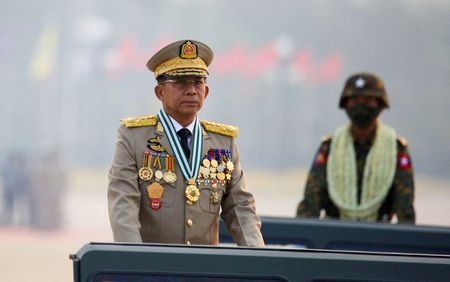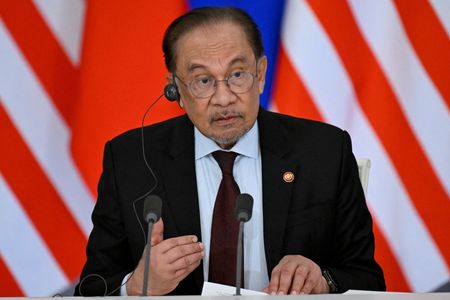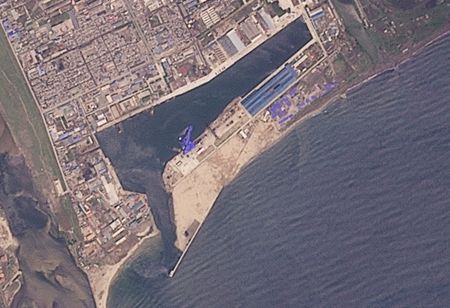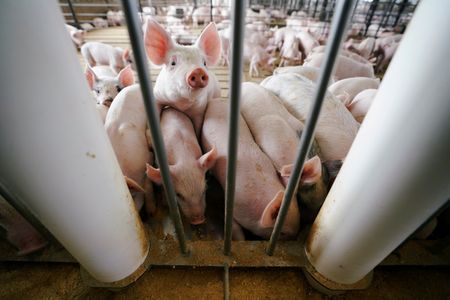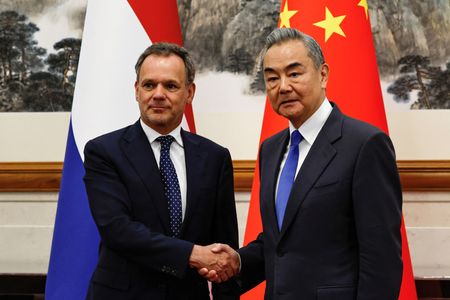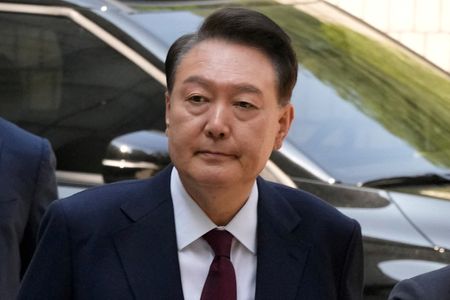By Panu Wongcha-um, Danial Azhar and Devjyot Ghoshal
BANGKOK/KUALA LUMPUR (Reuters) -Separate talks with Myanmar’s junta leader and his key rivals have borne fruit, Malaysia’s Prime Minister Anwar Ibrahim said, setting the stage for the first time for direct contact between two sides embroiled in a protracted and devastating civil war.
Junta chief Min Aung Hlaing flew into the Thai capital Bangkok for a closed-door meeting with Anwar last month and, a day later, the Malaysian leader held online talks with the shadow National Unity Government (NUG).
The NUG includes remnants of an elected government led by Nobel laureate Aung San Suu Kyi deposed in the 2021 coup orchestrated by Min Aung Hlaing.
Both sides were aware of the engagement, two sources with direct knowledge said, underscoring the willingness of Min Aung Hlaing to engage in peace efforts despite branding the government-in-exile as “terrorist”.
“We do engage separately, but I think it’s time for them to talk,” Anwar told reporters in Malaysia’s administrative capital Putrajaya on Wednesday. “I mean, the people in Myanmar have to decide for themselves.”
A junta spokesman did not respond to calls from Reuters seeking comment.
Nay Phone Latt, a spokesman for the NUG, said the shadow government would be open to talks with the military if it agreed to six conditions.
These include forming a new federal democratic union under a new constitution with no role for the military in politics and the creation of a transitional justice framework.
“If Myanmar’s military agrees to that, we will have a dialogue with military authorities regarding the termination of the coup and peaceful transition of power,” he told Reuters.
It’s unlikely that Myanmar’s military, which has ruled the country for most of its post-independence history, will accept those conditions.
But Anwar’s initiative, launched on behalf of the Southeast Asian regional bloc ASEAN that he currently chairs, marks the first time the military regime appears amenable to a dialogue since Myanmar was plunged into turmoil by the February 2021 coup.
The violence has killed thousands, displaced over 3.5 million people and decimated the economy of the Southeast Asian nation.
An armed opposition, comprising established ethnic armies and new resistance groups formed since the coup, has wrested chunks of territory from the junta, driving it out of border areas and increasingly hemming the territory it controls into the central lowlands.
Malaysian officials have begun outreach to some armed groups in Myanmar, a diplomatic source said, without providing further details.
GROUNDWORK FOR PEACE PROCESS
In Bangkok, Anwar publicly focused on securing a ceasefire extension to facilitate the delivery of humanitarian aid following a March 28 earthquake that killed more than 3,800 people, mostly in central Myanmar.
But the leader also utilised the opening to attempt to lay the groundwork for a broader peace process, according to four people aware of the discussions.
His initiative is slated to dominate the ASEAN Summit in Kuala Lumpur next week, with dedicated talks among bloc members focused on the conflict ahead of the gathering.
Anwar described his push as “the first serious attempt at engagement” by the bloc.
“We have to move beyond that,” he said on Wednesday.
ASEAN has been calling for a cessation of violence since the 2021 coup, pushing a peace plan known “Five Point Consensus” that has made little progress and barred Myanmar’s ruling generals from the bloc’s summits.
Backroom work for the Bangkok talks had started before the earthquake, three sources said, but the disaster provided an opportunity for Anwar to directly engage on humanitarian issues with Min Aung Hlaing, who has been shunned for nearly four years by successive ASEAN chairmen.
“The humanitarian exercise is important in itself, but to achieve it, we need a ceasefire. And a temporary ceasefire will in turn open up possible future pathways towards peace and reconciliation,” George Yeo, a former Singaporean foreign minister who is currently an adviser to Anwar, told Reuters.
ELECTION PLANS
The NUG had initially opposed the Anwar-Min Aung Hlaing talks in Bangkok, urging “utmost caution” for any unilateral engagement with the junta chief.
Since the Bangkok talks, the junta has announced extensions to a ceasefire initially agreed upon to support humanitarian relief following the quake – but it still kept up a deadly military campaign, including in areas devastated by the earthquake.
ASEAN Secretary-General Kao Kim Hourn this week declined to comment on the military’s continued offensive, saying it was unclear who had violated the ceasefire.
In the short term, the regional bloc needs to push the warring sides in Myanmar to respect the ceasefire.
“If everyone respects the ceasefire and sees the vital importance of humanitarian assistance, it could be a beginning point to bring the various sides for talks,” commented veteran diplomat and former Thai vice minister for foreign affairs Sihasak Phuangketkeow.
The renewed move to intensify dialogue in Myanmar also comes amid a junta plan to hold a general election in December, an exercise derided by its critic as a sham to keep the generals in power through proxies.
ASEAN had earlier said that the junta should prioritise making peace, instead of holding an election.
“Dialogue is important for the election, without it there is no legitimacy,” Sihasak said.
“We have to be realistic enough to see that an election is not the end of the conflict.”
(Reporting by Panu Wongcha-um and Devjyot Ghoshal in BANGKOK and Danial Azhar in KUALA LUMPUR; Editing by Raju Gopalakrishnan)

